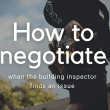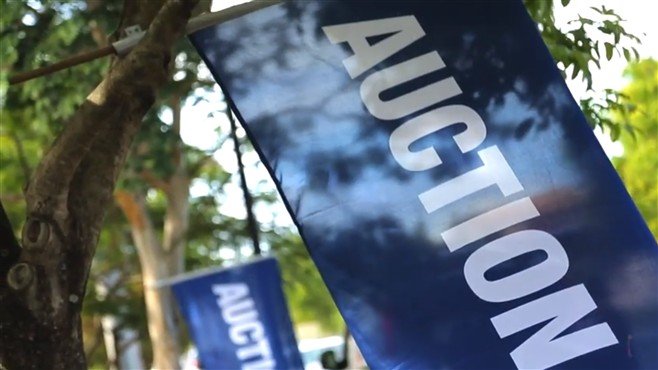Are you wondering how to bid at an Auction? Here you will find the answers to frequently asked questions, tips on how to bid and traps to avoid at all costs…
Podcast version:
Follow the podcast on Spotify, Google, Apple, or Stitcher.
Auctions can be daunting but they can also be a breath of fresh air in a market (like Wellington) that has been dominated by Tenders for as long as I can remember. Going through a Tender, or any blind-offering, competitive deadline situation can involve a massive amount of guesswork as you try to pitch your offer just right knowing you only have one chance.
The game of picking your price is extremely stressful, trying to make sure you are not so high that you pay too much, and not so low that you miss out on your dream home.
At least with an Auction, you can see exactly what other buyers are prepared to pay and decide accordingly whether you are ‘in’ or ‘out’. Buyers we speak to really appreciate the added transparency of this process.
So what’s the downside?
Some people can get carried away in the heat of an Auction and seem determined to win at all costs. Also, any bid you place is an unconditional offer so you have to have all your ducks in a row before you put your hand up. This can exclude some buyers since some people still feel they need to have a finance condition or don’t want to spend any money completing due diligence if they aren’t sure of getting the house.
While this is a valid concern it’s worth remembering that most properties we sell via Tender are now being won by unconditional offers. So in other words, if you aren’t unconditional then you don’t stand much of a chance in a Tender or Auction situation.
Now that we have that covered. How exactly do you go about bidding at an Auction?
5 Steps to get you ready…
Step 1. Research
Once the hammer goes down, the sale is final and you can’t pull out. It is imperative that you do all your homework before the Auction starts. Owners should be providing a LIM, builders report, rental assessment, title etc upfront but if they are not I seriously recommend you invest in these documents before you put your hand up to bid. If they are providing a builders report, we recommend using this as a starting point but encourage you to get your own report on the property as well.
Read: How to read a builders report, and How to read a LIM report
Step 2. Get your finance approved
Most banks will give you a ‘pre-approval’ for finance, which is subject to their ‘final approval’ of the sale and purchase agreement and the particular property you are purchasing, so most buyers rightly believe this means they need a finance condition when they offer. Buyers who bid at an Auction approach their mortgage broker or bank well before the bidding starts and ask for unconditional pre-approval for the particular property they are interested in.
Often banks will provide ‘one-off’ unconditional approval in this situation (up to a certain amount) so you can bid confidently knowing your finance has already been approved.
Click here to listen to my mortgage broker talk about how to make unconditional offers
Note: This is why your conditional offer in a Tender situation is next to pointless in this market. Most buyers are getting themselves in an unconditional situation and beating you to the punch. See my next step before you start doing this though!
Step 3. Consult with your solicitor
Before you put your hand up at an Auction or place an offer on any property you should get legal advice. I personally use Peter Jones from Jones Law. Your solicitor can review the Title, Auction document and LIM report for you to make sure there are no hidden fish hooks you should be aware of and they can help you by providing a rational sounding board in a situation where your emotions could get the better of you.
Read: Don’t buy a home without speaking to these 5 people first
Step 4. Register your interest
Tell the salesperson running the Auction that you are interested in bidding. Letting them know by email and/or over the phone is the best way. This is critical in case the Auction gets brought forward or a new piece of information / an important disclosure comes to light before the Auction starts.
Step 5. Decide on your strategy
Are you going to place an opening bid to un-nerve the competition? Or are you going to wait until the very last minute “Going once! Going twice!….” before you jump in? There is no right or wrong approach here. I do suggest you bid confidently right up until your max though. Stalling for time shows weakness and will only encourage other buyers to keep going, hoping you are just about to pull out.
How to bid at an Auction: FAQ
Q: Will I find out what the reserve is?
No. This stays private between the Auctioneer, the salesperson and the owners. It is usually decided the day before the Auction and owners want to be as realistic as possible so the best thing you can do to help them achieve this is to provide feedback to the salesperson during the process of where you think the reserve should be, based on other properties you have seen.
Q: What happens if the Auction doesn’t reach the reserve?
The top bidder has the first right to negotiate directly with the owner. In this situation, that top bidder will usually go into a separate office away from the main Auction room (with the owner in an additional separate room) and the Auctioneer will go between the 2 parties trying to negotiate a deal. Once a deal has been reached the Auctioneer will usually go back to the Auction room, announce the property as being ‘on the market’ and invite further bids from the audience before the hammer goes down.
Note: This doesn’t always happen though, and some buyers are able to negotiate a situation where the sale is immediate and the property is not offered back up to the Auction room at their negotiated price (rare but it does happen occasionally). Once the Auctioneer leaves the room there is no guarantee you will get another chance, so it’s always safest to be the top bidder when the Auction stops!
Q: Should I make a pre-auction offer?
If you are on a tight timeframe (eg. you are going overseas before the scheduled auction date) this could be a good idea. Your offer will need to be unconditional and it will need to have a bank cheque attached for the deposit (usually 10% of the purchase price) If the owners accept your pre-auction offer the Auction will likely be brought forward to a date 2 working days from the owner’s acceptance. Your offer will become the opening bid and reserve price and other buyers will still have the chance to outbid you (they shouldn’t find out your offer price until the Auction starts though).
If your offer is turned down by the owners it will remain private and no other buyers should be informed of the offer price. Owners will not likely counter-sign or negotiate in this situation.
If you can offer enough to get the Auction brought forward it can give other buyers less time to get ready, which means you may have less competition which is a plus for you, although you are playing your hand early so cagey buyers may not like this approach. Most owners are open to pre-auction offers but always ask the salesperson if that is the case before offering as every property is a different situation.
Tips and Traps to watch out for…
Key TIP no.1 – Don’t get caught out-bidding yourself.
If you are the only bidder, you should be negotiating with the owner 1 on 1. Don’t outbid yourself unnecessarily. It might sound stupid but I have seen this happen before – when there is only 1 bidder in the room and the Auctioneer is vendor bidding against them, and they just keep going up thinking there must be someone else in the room also trying to buy the property.
If you can’t see another bidder sitting near you, putting their hand up, or on the phone with a salesperson then you are likely the only bidder. If in doubt, stop bidding and see what happens. When an Auctioneer is vendor bidding they will say ‘the bid is with me at XYZ amount’. If you are the only bidder you want to get into a separate room and try to negotiate a price with the owner (via the Auctioneer) as quickly as possible.
Key TIP no.2 – Have some wiggle room!
So many buyers go to an Auction saying “I will not bid a cent over $400k” and then watch the property sell a few minutes later for $406k (or something similar). Yes you stuck to your guns and that’s great, but you will probably regret it for weeks to come, especially if the market keeps rising. Just ask anyone who missed out on a home 6 months ago and is still looking now!
Don’t miss out on a property you like for a small amount. Ask the bank to pre-approve you for a bit more than you think you will need before the Auction starts, just in case. You don’t have to use it if you don’t want to. If the bank isn’t an option you can ask family if they will give you the extra $3, 4, 5k you need to get you over the line if it comes down to that.
Key TIP no.3 – Remember who the Auctioneer is working for.
The Auctioneer is there to get the best possible price for the owner. They are not obliged to tell you what the reserve is at any time. If you are negotiating one on one, always remember they are hired to get you to pay as much as possible. This doesn’t mean you shouldn’t do everything you can to buy it. Just go into this process with your eyes open, especially if you are the only buyer!
Key TIP no.4 – Do your homework first.
I don’t know the meaning of risk-averse. I throw caution to the wind and worry about it later. Don’t be like me. Do your research. Know what you are getting yourself into. Try and figure out if there are big costs looming (eg. new roof, new wiring etc) and set your budget accordingly. All properties need some work so don’t let these things put you off, but try to avoid nasty surprises when you move in if at all possible.
Key TIP no.5 – Remember it’s a game.
I know this is the biggest purchase of your life so far and it’s a massive deal. You have to try and keep calm though and not get too emotionally attached (I know, I know, easier said than done). The best way to do this is to treat it as a game. Try and figure out other people’s strategies and have fun with it as much as you can. Try to enjoy the process, you won’t get to do it that often hopefully! There will always be other houses, there will always be other opportunities. If it doesn’t work out, let go and move on and don’t dwell on situations you can’t change.
Bonus TIP: Auctions usually have a fixed settlement date and a set deposit amount (usually 10%). You can often negotiate these if you want to settle on a different date or pay a different deposit (eg. 5%) but you need to arrange this before the Auction starts. You will likely need to fill in a variation form and have that signed by the Vendor before the bidding begins. Ask your salesperson if you want to make a change.
Need help specific to your situation? Book a one-on-one consultation online.
Further reading:
Don’t buy a home without speaking to these 5 people first
Buying or selling at Auction (REA website)
Auction day preparation for owners
As always, stay safe out there and make smart property decisions people!










Really informative, Thank you.
Do you need a loan to pay off your bills? Or for your Business if yes Email us opploansllc@gmail.com
Useful tips, thank you
Thanks Sue, much appreciated!
I never thought about doing a bit of research on a possible auction purchase. My husband has been thinking about attending a few auction sales, but I don’t know how often they’re going on. I’ll have to look online and see if there are any local auctions going on soon.